New Government directive on two-level local government operations
The arrangement and operation of the two-level local government are basically stabilizing, in the right direction, and in line with the people's aspirations, resolving difficulties and problems that have existed for many years.
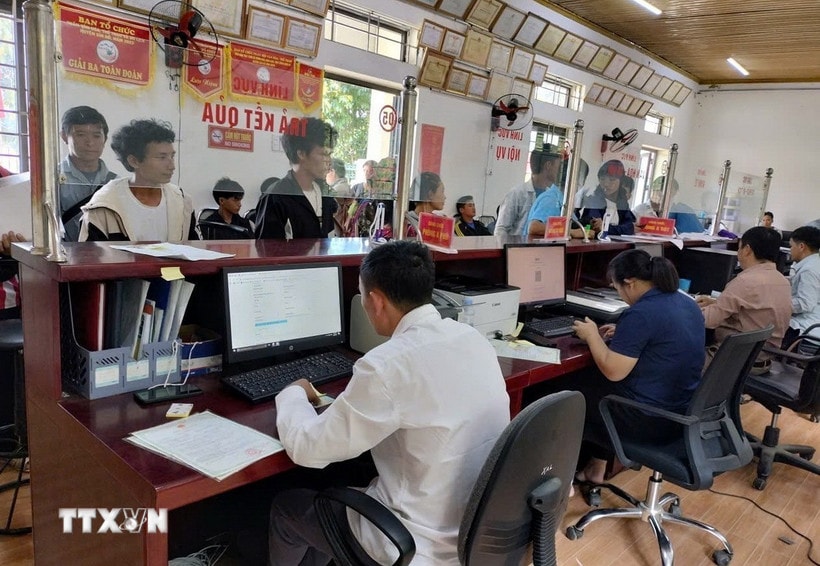
The Government has just issued Resolution 268/NQ-CP on the implementation and operation of the two-level local government model.
Operational situation of the two-level local government organization model
The Resolution stated that in recent times, the arrangement and operation of the two-level local government has been considered a revolution in organizational structure, rearranging the country to have new provisions and new momentum to enter a new era - an era of rising up, becoming rich, strong, civilized, prosperous and thriving.
The implementation of the two-level local government model has been strongly led and directed by the Politburo, the General Secretary, the Government, and the Prime Minister, and seriously implemented by ministries, branches, and localities, achieving many important results, creating a clear shift in the organization and operation of the state administrative apparatus.
The arrangement and operation of the two-level local government has received the general consensus of the whole country, the support of the people, the drastic participation of the entire political system, achieved positive results, is basically stable, in the right direction, accurate, in line with the aspirations of the people, resolving difficulties and problems that have existed for many years.
About institutionsFrom June 1, 2025 to August 23, 2025, the Government issued 112 Decrees and Resolutions on legal norms (from August 1, 2025 to August 23, 2025 alone, the Government issued 16 Decrees) and many guiding documents, focusing on key areas such as national defense, inspection, environment, finance, education, science, technology, apparatus organization, civil service regime... creating a complete and synchronous legal corridor for the new model. This is an important basis for localities to unify implementation, ensuring legality, constitutionality and effectiveness of state management.
About the organization, localities have basically completed the arrangement and consolidation with 465 specialized agencies under the provincial People's Committee, 9,916 specialized departments at the commune level were established and put into stable operation. Facilities and means to serve the tasks were reviewed and supplemented; many communes and wards were equipped with additional headquarters and working facilities, meeting the requirements of management and operation at the grassroots level.
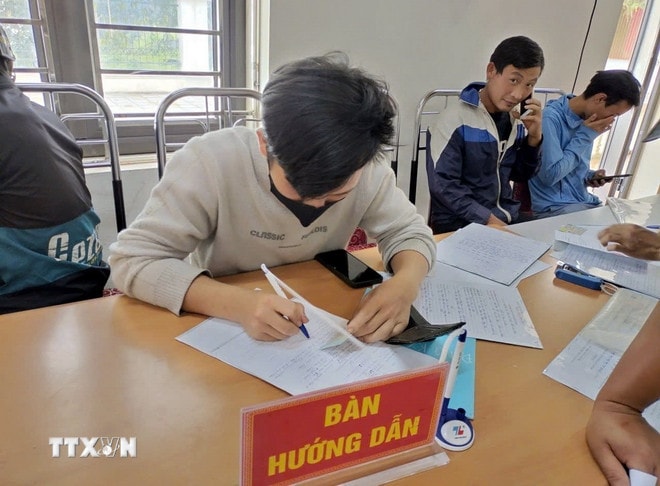
On personnel work, the settlement of policies and regimes for the team after the rearrangement is implemented promptly and transparently.
As of August 19, 2025, nationwide, 94,402 people had decided to quit their jobs; the total number of people submitting to competent authorities for approval of funding and the number of people whose funding has been approved by competent authorities is 81,410 people; of which 75,710 people have had their funding resolved according to regulations.
This demonstrates the practical care and concern of the Party and State, ensuring the rights of cadres, civil servants and public employees, while creating consensus and stability within the team.
About training and developmentMinistries and branches have organized training conferences with more than 3,300 online locations nationwide, focusing on disseminating and updating new regulations and improving management capacity for tens of thousands of cadres, civil servants and public employees at all levels.
The content covers the fields of law, finance, education, labor, diplomacy, trade, agriculture, environment, science, technology, innovation and digital transformation, health, culture, sports and tourism..., contributing to improving professionalism and efficiency in public service performance.
On administrative reform and digital transformationFrom July 1, 2025 to August 23, 2025, the total number of records received by 34 provinces and cities is 6.5 million administrative procedure records, of which 4.8 million administrative procedure records are at the commune level; 73.8% of records are online; 80% of the total number of records received have had results returned to the people, of which 72% of records are on time or ahead of schedule; some localities have a large number of records such as: Ho Chi Minh City (753,000 records), Hanoi (500,000 records), Hai Phong (325,000 records), Dong Nai (320,000 records), Nghe An (270,000 records), Thanh Hoa (269,000 records), Dak Lak (251,000 records)...
Promoting the application of information technology, digitalization, and national data interconnection has contributed to improving transparency, efficiency, and reducing time and costs for people and businesses.
On the political security situation, social order and security are maintained, public opinion positively evaluates and agrees with the innovation policies and guidelines. People, cadres and party members express their confidence in the leadership of the Party and the direction of the Government in building a two-level government model.
The results achieved have affirmed the correctness and timeliness of the reform policy, creating a solid foundation to continue perfecting and effectively operating the two-level local government model in the coming time.
Existence, limitations and causes
Besides the achievements, there are still limitations and difficulties that need to be focused on overcoming such as:
- The consolidation of the local organization and personnel after the merger is still facing difficulties. In general, the current human resources at the grassroots level are both redundant and insufficient, and limited in terms of professional quality and technological skills.
- There are still many limitations in infrastructure: Some localities still lack or have degraded, cramped, and scattered headquarters; public administrative centers are far away, not convenient for people. Handling redundant headquarters according to the plan to convert functions into medical, educational, and public works facilities still faces many difficulties. There are still many houses and land facilities that need to be handled, and the handling progress is still slow.
- The financial-budgetary mechanism has not kept up with the new model while the management area is wider. The assignment of budget expenditure tasks after the reorganization still has many problems, and some assigned tasks are not consistent among units.
- Information technology infrastructure from central to local levels is still lacking in synchronization, causing difficulties in connection and not ensuring comprehensive public services.
- Propaganda and dissemination work on the two-level local government model in some places is not really extensive; a part of the people, cadres and civil servants are still not familiar with the new way of operating.
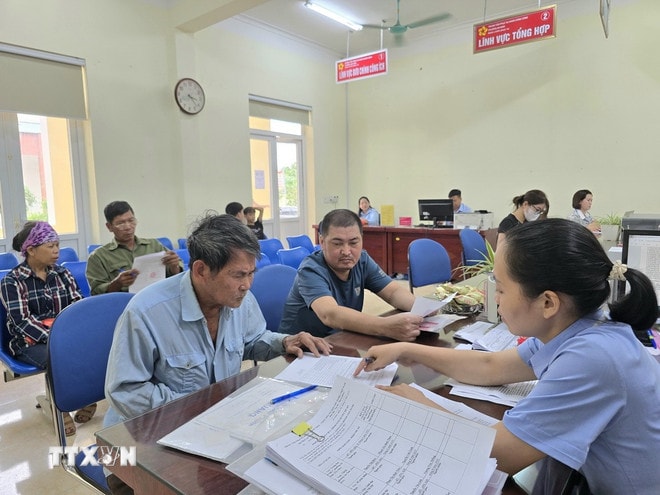
The main reason is that the arrangement, consolidation of the organizational apparatus and personnel allocation in a short time leads to a situation where there is a surplus of staff in some places and a shortage in others. The quality and skills of civil servants at the commune level, especially in the fields of land, finance, law, information technology, planning and construction, do not fully meet the requirements of the tasks.
Facilities and technical infrastructure in many localities are not yet synchronous, many offices are degraded, lack equipment and public vehicles, and the information technology system is limited, the connection is unstable, affecting operational efficiency.
Some implementation guidance documents have not been issued in a timely and complete manner; decentralization and delegation of power are still formal, reducing the initiative of local authorities; financial resources are not guaranteed; progress in allocating additional budgets and handling surplus assets and books is still slow.
The urgent implementation time, while objective conditions in many localities, especially mountainous areas, islands, remote and isolated areas, still face many difficulties, is also a cause hindering the full and timely implementation of tasks as prescribed.
Removing difficulties and legal problems related to the activities of two-level local governments
To continue to effectively implement the tasks of ensuring the stable and smooth operation of the two-level administrative unit apparatus, serving the people and businesses better and better; at the same time, promoting socio-economic development, ministries, branches and localities need to focus on implementing a number of key tasks and solutions.
Regarding institutions, the Government requires ministries, branches and localities to continue to comprehensively review legal documents, especially regulations on decentralization, delegation of powers and assignment of authority; urgently and resolutely complete the system of documents regulating and guiding the implementation of the 2-level local government model, creating a complete political and legal basis, ensuring favorable conditions for localities to implement.
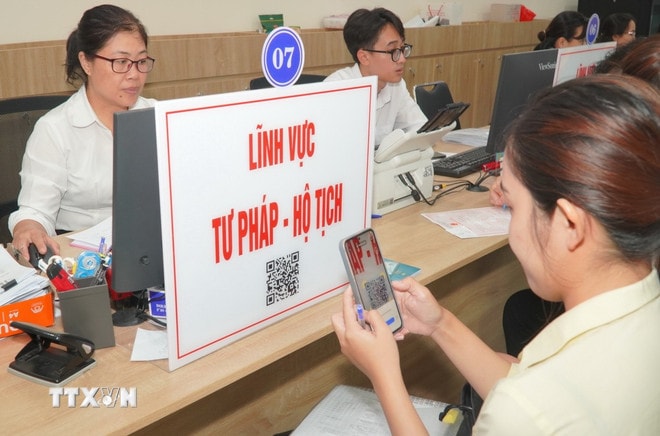
Ministers, Heads of ministerial-level agencies and Government agencies directly lead, direct, advise and propose to remove difficulties, obstacles and legal bottlenecks that have been reviewed according to the conclusions of the Central Steering Committee on improving institutions and laws; urgently direct and guide the handling and removal of difficulties and obstacles directly related to the activities of local governments at two levels, especially for socio-economic development projects and programs, and to effectively implement local growth targets and targets in 2025.
Prioritize administrative procedure settlement for people and businesses, avoid backlog and delay
Regarding administrative procedure settlement at the grassroots level,The Government requires ministries, branches and localities to focus on prioritizing the settlement of administrative procedures for people and businesses, avoiding backlogs and delays.
This must be identified as the top priority: Removing difficulties, obstacles, and bottlenecks in administrative procedure implementation is the resource and driving force for development.
Continue to maintain training and guidance for the grassroots, especially at the commune level; inspect and supervise the implementation of settlement in accordance with regulations, to avoid congestion.
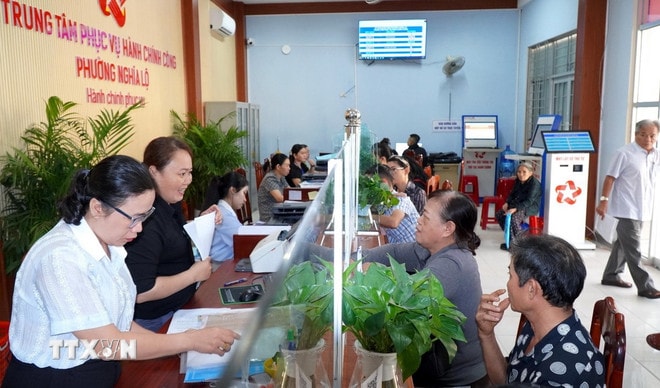
Localities shall carry out administrative procedures under the one-stop mechanism and the inter-connected one-stop mechanism at the Public Administration Service Centers at all levels in accordance with the provisions of Decree No. 118/2025/ND-CP; in particular, the establishment of a one-level Public Administration Service Center shall comply with the provisions at Point c, Clause 2, Article 15 and Clause 1, Article 16 of the Law on Organization of Local Government; the establishment of a commune-level Public Administration Service Center shall comply with the provisions at Point a, Clause 2, Article 21 and Clause 1, Article 22 of the Law on Organization of Local Government.
The Government Office drafts a Decree amending and supplementing a number of articles of Decree No. 63/2010/ND-CP on controlling administrative procedures according to simplified procedures, ensuring effective implementation of the Law on Promulgation of Legal Documents in 2025, strictly controlling the issuance and maintenance of administrative procedures that are truly necessary, reasonable, legal, and have the lowest compliance costs, and submitting them to the Government in 2025; providing guidance on standardization and unification of the scope of publication of internal administrative procedures according to the province's jurisdiction.
Urge ministries and ministerial-level agencies to promptly announce and update the national database on newly issued, amended, supplemented or abolished administrative procedures as a basis for localities to announce and publicize administrative procedures under their jurisdiction in the area.
The Ministry of Justice urgently issues unified regulations on the level of online public services in the field of certification; upgrades the civil status software system, ensuring connectivity with the administrative procedure system of provinces and cities; fixes information asynchronization errors between the Civil Status Management Information System and the Administrative Procedure Resolution Information System to promptly address people's needs for performing administrative procedures related to civil status.
Urgently issue specific guidance documents on the basis for land recovery, allocation and lease.
On planning and land work, The Government assigned the Ministry of Construction to urge and inspect the implementation of Resolution No. 66.1/2025/NQ-CP dated July 18, 2025 of the Government stipulating the handling of difficulties and problems in establishing new, adjusting and approving zoning plans for urban areas when rearranging administrative units at all levels and organizing 2-level local governments.
Orientate new development space, adjust appropriate planning to maximize the different potentials, outstanding opportunities, and competitive advantages of each administrative unit at provincial and commune levels.
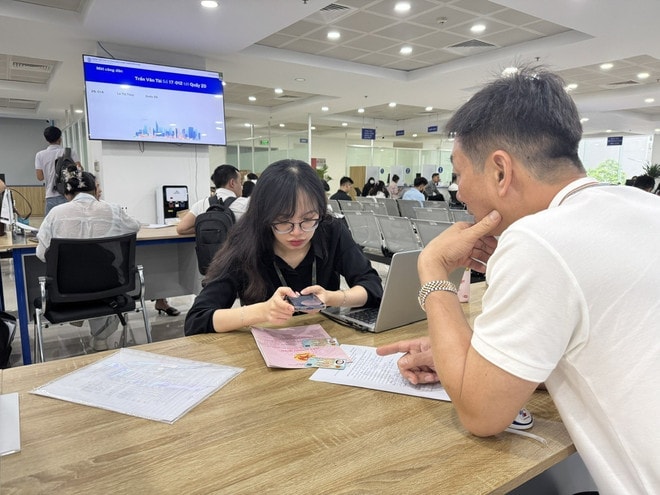
The Ministry of Finance studies and considers the shortened process and procedures for approving adjustments to new provincial and municipal planning to promptly meet the socio-economic development needs of localities.
The Ministry of Agriculture and Environment urgently issues specific guidance documents on the basis for land recovery, allocation and lease according to the Land Law; guides the preparation of commune-level land use plans and plans according to the provisions of Decree No. 151 and Circular No. 23/2025/TT-BNNMT; advises on the implementation of a unified land price framework after the merger, as a basis for implementing compensation and site clearance work.
Guidance on the arrangement and assignment of non-professional staff
Regarding the organization and staffing, and personnel work, the Government assigned the Ministry of Home Affairs to urgently advise and submit to the Government documents amending and supplementing regulations on organization, staffing, recruitment, assessment, planning, training, and fostering of staff according to the new regulations of the Politburo so that localities have a basis for unified implementation, and promptly submit to the Government for promulgation regulations on criteria and procedures for arranging villages and residential groups.
Coordinate with relevant ministries, branches and localities to guide the arrangement and assignment of non-professional staff for localities to implement; guide on the functions, tasks and powers of public service units so that commune-level People's Committees can review and adjust the functions and tasks of affiliated public service units to ensure consistency and unity.
Urgently advise the Government to issue regulations on administrative unit standards, administrative unit classification and urban classification in September 2025.
The Ministry of Home Affairs shall preside over and coordinate with relevant agencies to urgently advise and submit to the Government for promulgation of guiding documents on title standards and job positions, thereby serving as a basis for determining the appropriate number of staff, ensuring the smooth and effective operation of the apparatus. Ministries, branches and localities shall urgently complete the positions of missing staff, ensuring the number; during the completion process, they shall learn from experience and propose solutions to improve the effectiveness of personnel work, ensuring the smooth and effective operation of the apparatus.
The Ministry of Home Affairs shall preside over and coordinate with the Ministry of Education and Training, the Ministry of Health, relevant ministries and localities to review the overall demand for civil servants in the education and health sectors in localities; guide, monitor and inspect the implementation of recruitment to ensure compliance with regulations on the number of positions assigned immediately from the 2025-2026 school year; proactively develop a salary and allowance project, report to competent authorities for decision to apply generally and consistently throughout the political system.
The Ministry of Education and Training and the Ministry of Health review the Circulars guiding the staffing norms of the education and health sectors and fields, ensuring compliance with the policies and conclusions of the Politburo and the reports of the Central Steering Committee before promulgating them according to their authority.
Arrange and rotate staff in accordance with local realities
Regarding the dispatch of cadres from ministries and branches to localities, the Government assigned the Ministry of Home Affairs to preside over and guide the dispatch of cadres to localities based on the specific needs and proposals of the localities (issues requiring support to be resolved, number of cadres, time limit, etc.), thereby ensuring reasonable arrangement of cadres based on local coordination, avoiding waste, omissions and overlaps.
Localities need to be proactive in arranging, organizing, and rotating staff to suit the practical situation of the locality, avoiding situations where there are excesses in some places and shortages in others, which cannot meet work requirements.
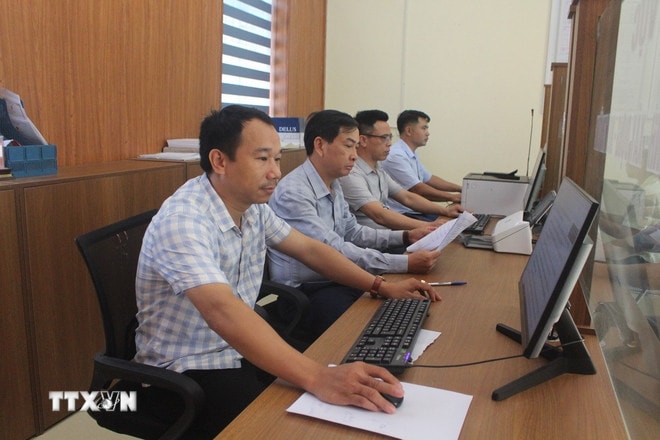
The Ministry of Home Affairs coordinates with relevant ministries and branches to develop specific standards for each job position, which will serve as a basis for recruitment, rotation and appointment of officials, ensuring transparency and efficiency.
Develop specialized and highly applicable training programs, especially in the fields of finance, law, information technology and planning.
Research and develop online instruction content, detailed step-by-step, disseminated on social networking platforms and online training systems for commune and ward level officials to research and learn, especially processes, regulations, standards... to use in the process of performing tasks.
Building a specific, separate financial mechanism suitable for each type of 2-level administrative unit
The Ministry of Finance shall preside over and continue to allocate financial resources from the central budget to support investment in infrastructure and public housing in newly established communes, wards and special economic zones, especially in mountainous and disadvantaged localities.
In addition, the Ministry of Finance shall preside over and coordinate with ministries, branches and localities to research and develop specific and separate financial mechanisms suitable for each type of two-level administrative unit (for example: urban areas, mountainous areas, islands...) to ensure resources are allocated effectively./.


